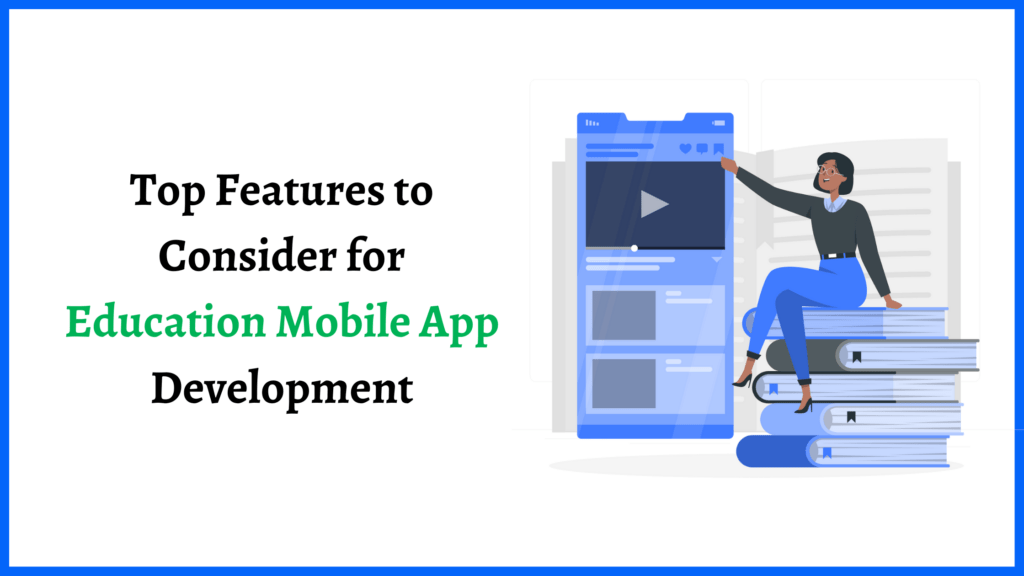
Educational mobile apps have changed the way students grasp knowledge. They’ve made educational content available to those with limited access to traditional learning resources. It’s no wonder they are rapidly increasing in demand.
Today, there are over 450,000 eLearning apps on the Google Play and Apple Apps Stores. These include popular names like edX, Evernote, Duolingo, BrainPOP, and Quizlet. The education apps market is certainly a flourishing one; it’s expected to be worth $602 billion by 2020.
Technological advancements have improved educational app development and led to the integration of several features to further enhance the learning experience. If you’re interested in entering the edtech app market, knowing what users might expect from your app is important.
Essential Features to Be Added During Education App Development
Education app development should focus on features that make the app engaging for students and provide them with a comprehensive learning experience.
1. User-Friendly Interface and Intuitive Navigation
A user-friendly interface is a must for any mobile app. Education apps are no exception. Making the app easy to use and navigate should be your priority, so consider what they’d want. Ask the education app development company you hire to do the same.
Users should be able to access the desired content without any confusion. Make menu options clear and easy to spot. Also, add search functionality and well-organized content categories, these can greatly enhance the user experience.
2. Personalized Learning Experience
Every learner has unique preferences and requirements. An effective education app should incorporate features that allow users to personalize their learning experience. This can include customizable profiles, adaptive learning algorithms, and the ability to track progress. The app can also provide tailored recommendations based on individual strengths and weaknesses.
3. Interactive Content and Gamification
Engaging and interactive content is crucial to keep learners motivated and interested. Adding multimedia elements such as videos, images, and audio boost interaction with the users. It plays a big role in making the learning process more dynamic and captivating.
Additionally, gamification elements like quizzes, challenges, and rewards can enhance user engagement and make the learning experience more immersive and entertaining.
4. Offline Accessibility
Internet connectivity may not always be available, especially in certain remote areas or during travel. Have your educational app developers add offline accessibility features to ensure uninterrupted learning.
Users should be able to download and access content offline, allowing them to continue learning without an internet connection.
5. Collaborative Learning Tools
Education is not just about individual learning; it often involves collaboration and interaction with peers and instructors. Including collaborative learning tools in the app, such as discussion forums, chat functionality, and group project features, is helpful. It can foster a sense of community and enable learners to connect and learn from each other.
6. Progress Tracking and Assessment
To gauge the effectiveness of the learning process, it is important to incorporate features that allow users to track their progress and receive assessments. This can include performance analytics, quiz scores, and personalized feedback.
The app should provide learners with clear insights into their strengths and areas for improvement.
7. Incorporation of Learning Management Systems (LMS)
Many educational institutions and e-learning platforms have introduced Learning Management Systems (LMS). These are designed to help students manage their content and track progress. An ideal education app should seamlessly integrate with popular LMS platforms. It should allow users to access their existing accounts and synchronize their progress effortlessly.
8. Push Notifications and Reminders
Keeping learners engaged and informed is crucial for successful education apps. Implementing push notifications and reminders can help users stay updated on new content, upcoming deadlines, and important announcements. Customizable notification settings can ensure that users receive relevant information without feeling overwhelmed.
9. Secure and Privacy-Conscious
As education apps may handle sensitive user data, maintaining high security and privacy is paramount. Implementing robust data encryption, secure authentication methods, and complying with privacy regulations like GDPR (General Data Protection Regulation) can instill user confidence and protect their personal information.
10. Multiple Language Support
Catering to learners from different linguistic backgrounds is essential in a diverse learning environment. Incorporating multiple language support in the education app is important to ensure accessibility and inclusivity. By offering the app in multiple languages, learners from various cultural backgrounds can engage with the content comfortably and effectively.
Conclusion
Developing an education mobile app requires careful consideration of various features to ensure a seamless and engaging learning experience. From a user-friendly interface and personalized learning options to interactive content, offline accessibility, and collaboration tools, each feature plays a vital role in enhancing the app’s effectiveness.
Additionally, integrating progress tracking, seamless LMS integration, push notifications, and robust security measures are essential for a successful education app.
By incorporating these top features into your education mobile app, you can create a platform that empowers learners, fosters engagement, and provides a valuable educational resource. Hiring an education app development company will help you make the most of technology to deliver an exceptional learning experience.